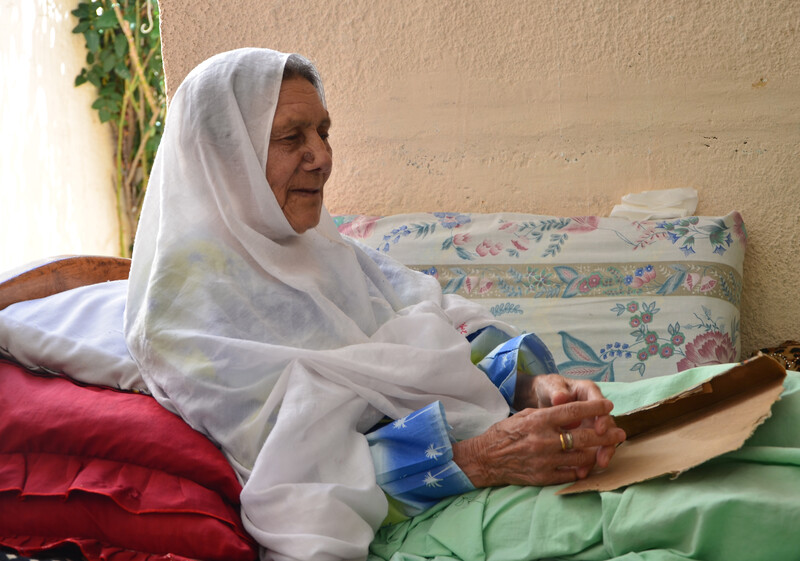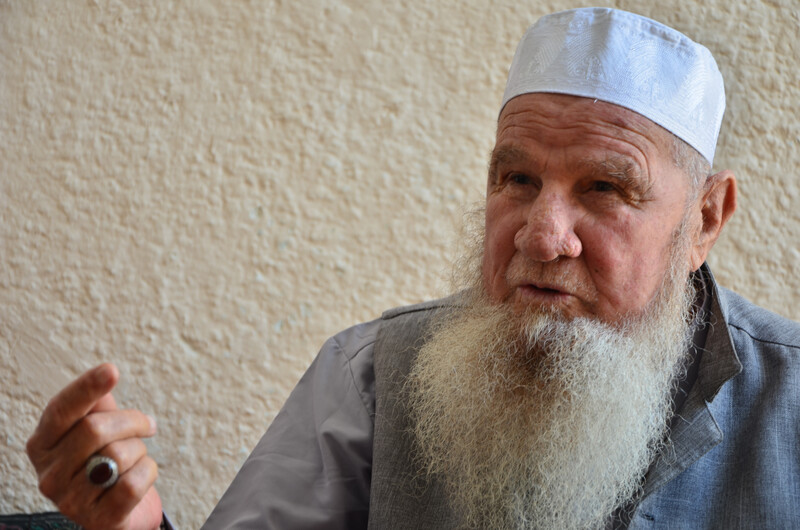The Electronic Intifada Maghazi refugee camp 15 May 2014

“Our life was great. We lived in peace, working in our own lands,” Um al-Walid Eid says of Zarnuqa village before the 1948 ethnic cleansing of Palestine.
“Kadima!” — a Hebrew word meaning “advance quickly” — is one of the words that Um al-Walid Eid still remembers from the day she, her husband and their two small children, along with the approximately 2,600 other Palestinian inhabitants, were forcibly expelled from the village of Zarnuqa.
Beginning in late 1947 and throughout 1948, Zionist militias and later the Israeli army began the organized expulsion of Palestinians. Some 750,000 Palestinians fled or were expelled from more than 450 from villages, towns and cities in Palestine; the violent dispossession has since been called the Nakba. This catastrophe is marked each year on 15 May — Nakba Day.
The expulsion of the residents of Zarnuqa in June 1948, by the Israeli army’s Givati Brigade, was part of “Operation Barak.”
Today Um al-Walid and her husband Abu al-Walid Muhammad Eid, both in their eighties, live in the Maghazi refugee camp in the occupied Gaza Strip, where they still carry many memories of their expulsion and their life before it.
“I remember that day well. I was so frightened that I forgot to pick up my son, Walid, who was only ten days old and wrapped in swaddling clothes. My sister helped me by picking him up and we all headed for Gaza to begin living far away from our homes, farms and lives. As we left, one of the Jewish militia members shouted at us ‘Kadima!’”
Um al-Walid is now in frail health and spoke from her bed from which she can only move with difficulty. She recalled some of the horrors perpetrated by the invaders.
Terrorized
“What had intimidated and terrorized us, forcing us out of the village swiftly, was the Zionists killing of a chaplain and a woman, right at a local small mosque that belonged to Sheikh Issa Shurbaji. We heard that the Zionists stormed the mosque and threw a grenade inside, instantly killing Sheikh Ahmad Abu Shawish as well as Sheikh Shurbaji’s wife. This was the most heinous crime that forced us to flee for our lives.”
Despite her poor health, Um al-Walid remembers better days when she was young and worked with her husband on the farm. “Our life was great. We lived in peace, working in our own lands. The day we were forced out we had about 600 Palestinian pounds in savings.”
Visitors
Abu al-Walid, who wears dark glasses and a white beard, sat on his own bed, near his wife. A retired employee of UNRWA, the UN agency for Palestine refugees, he and his wife live with their children and grandchildren in a modest house with a small yard where an olive tree is planted.
Visibly emotional, he recalled the day he went back to Zarnuqa as a visitor in 1973. That was six years after Israel occupied the West Bank and Gaza Strip and Palestinians could travel to see their former homes with relative ease. Today, with the Gaza Strip virtually sealed off, such a visit would be all but impossible.
“My friends and I took a cab to visit Zarnuqa,” Abu al-Walid said. “While we were looking for our abandoned homes, an Israeli man and his wife came up to us and asked us what we wanted. We said we were going to see those old homes and the man responded by saying, ‘You should first ask permission from the homeowners.’ I felt extremely sad and wondered how fate had turned us from the owners of the houses into mere visitors.”

“I’m not going to accept any compensation for my hometown and lands,” says Abu al-Walid Muhammad Eid.
A suburb of Rehovot, a town in the center of present-day Israel, is built on much of Zarnuqa’s lands today. According to All that Remains, Palestinian scholar Walid Khalidi’s seminal volume on the ethnic cleansing of Palestine, the few original village houses that remain standing are “either occupied by Jewish inhabitants or fenced in and used for storage.”
After this episode, Abu al-Walid decided not to go back to Zarnuqa except when Palestinians as a whole are allowed to return to their original lands and homes.
“I am still dreaming of going back to Zarnuqa and I am not going to compromise my village and farmlands, even in return for the holy shrines in the city of Mecca,” he declared.
Going home
Asked if he would accept financial compensation instead of return — as many peace plans have proposed — Abu al-Walid insisted: “Over my dead body. I’m not going to accept any compensation for my hometown and lands. My family and I owned about twenty acres where we produced many vegetables that we used to sell in the city of Ramle just a few miles away.”
Abu al-Walid said he hoped that Palestinian negotiators would never renounce the rights of refugees like him. But he sees no contradiction between his right to return and the possibility of the kind of peaceful coexistence he remembers from his youth.
“I remember that very close to my village there was a Jewish neighborhood. I used to exchange morning and evening greetings with a Jewish farmer while he and I were bending down in labor on our separate farms. I only exchanged greetings with him and I have no problem to exchange greetings and to coexist again when I return home to my village of Zarnuqa.”
Rami Almeghari is a journalist and university lecturer based in the Gaza Strip.





